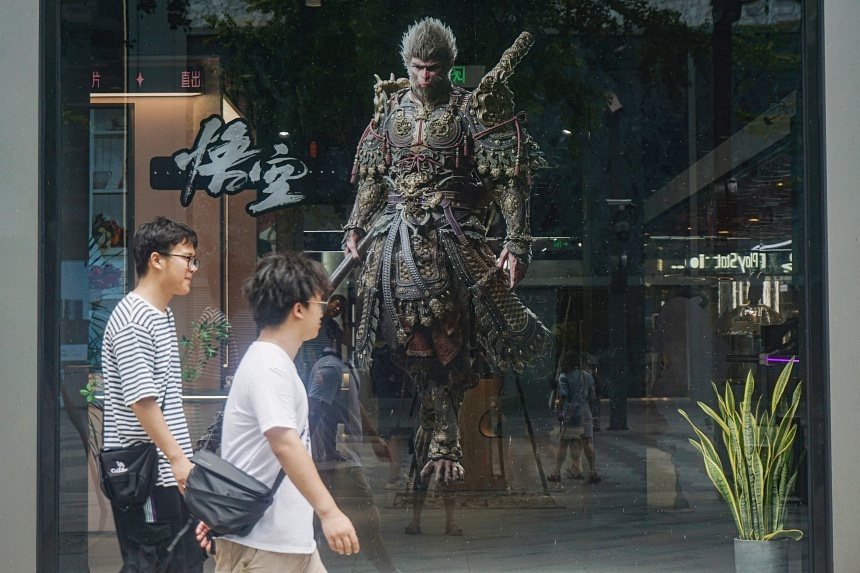 Wukong is China’s first AAA game - an industry term referring to high-budget, high-profile titles by well-known publishers. PHOTO: AFP
Wukong is China’s first AAA game - an industry term referring to high-budget, high-profile titles by well-known publishers. PHOTO: AFPLim Min Zhang
China Correspondent
Aug 22, 2024
BEIJING – Gaming enthusiast Yang Jingyan was among hundreds of thousands of Chinese who played China’s first blockbuster video game, Black Myth: Wukong, on the first day of its release on Aug 20.
He had been looking forward to the action role-playing game featuring the hero Sun Wukong, or the Monkey King, ever since it was announced in 2020 by its developer, Shenzhen-headquartered studio Game Science.
To him, the wait was worth it.
What impressed Mr Yang is not just the game’s fluid combat gameplay and elaborate character designs, but also its attention to Chinese culture and mythology, such as the use of narration in the form of Chinese opera.
“In my eyes, it is by no means inferior to other AAA games that I’ve played,” said Mr Yang, 25, a master’s student in Chinese medicine in Beijing.
Wukong is China’s first AAA game – an industry term referring to high-budget, high-profile titles by well-known publishers – a field traditionally dominated by American and European studios.
The power of the world’s largest gaming market meant that within a day of its release, Wukong surged to become the most-played single-player game ever on Steam, a popular video game distribution platform. Nearly 90 per cent of its players are from China, where it generated significant buzz.
State media Xinhua ran a 30-minute documentary on the game’s makers on Aug 19, companies from computer-maker Lenovo to Luckin Coffee unveiled Monkey King-themed promotions, and dozens of top live streamers played the game on Bilibili and WeChat. It was the top trending topic on Chinese microblogging site Weibo throughout Aug 20.
The recognition given to Wukong marks a turnaround for China’s gaming industry, which has faced regulatory crackdowns in recent years.
In 2021, Chinese state media described gaming as “spiritual opium”, raising concerns about excessive gaming by young people. In December 2023, China’s gaming regulator proposed draft legislation to curb the amount of money people spend on video games – a move which tanked stocks of gaming companies, and was later walked back.
However, since 2024, local governments have eased restrictions and pushed incentives.
In July, the Press and Publication Bureau of Guangdong province issued a notice saying that game companies can test games online without first receiving an official licence. In March, the Hi-Tech Zone in the city of Chengdu dangled rewards of up to 500,000 yuan (S$91,600) to game developers for each licensed, original work published for the first time.
According to the China Gaming Industry Report on the first half of 2024, sales revenue of the domestic market was 147 billion yuan, a year-on-year increase of 2 per cent. This represented positive growth for the first time in three years, compared with the same periods in 2022 and 2023.
Chinese analysts estimated that Wukong has sold more than 4.5 million copies at its launch and this has raised hopes that it can become China’s next big cultural export. For comparison, another AAA action role-playing game, Elden Ring, by Japanese developer FromSoftware, has sold more than 25 million copies since its February 2022 launch.
Mr Sheng Ziyi, 34, who works in real estate in Hubei, appreciates that Wukong is a made-in-China product featuring a Chinese take on a classic Chinese tale, namely Journey To The West.
“In the past, I had to find the settings to change the language to Chinese, and even do a patch (to play other AAA games in Chinese),” he said. He has played other hits such as Red Dead Redemption 2 by US publisher Rockstar Games, and Elden Ring.
“Now, it’s the foreigners’ turn to learn Chinese and watch Journey To The West,” he added. Unlike most other AAA games, the default language for Wukong is Chinese.
But Assistant Professor Cao Xuenan, who teaches cultural studies at The Chinese University of Hong Kong, said that to overseas gamers, the fidelity to Chinese culture does not matter as much as game quality and its mechanics.
“The game was well designed to reflect Chinese culture and mythology, but I think for the gaming community – its intended audience – they don’t care as much about that as other technicalities, as whether the game looks good, and whether the game’s map and economy make sense,” she said.
US-based game reviewer and YouTuber Michael Onorato believes Wukong has left an impression internationally as it rivals the best the industry has to offer in aspects such as gameplay, visuals and storyline.
“If you look at the breakdown, it’s important to realise that even if 2.2 million people are playing Wukong on Steam and 90 per cent of that is Chinese gamers, that’s still about 200,000 to 300,000 international players at least.
“I would argue this is a worldwide success... especially for a single-player game and coming from a relatively unknown studio without an established reputation. This is a best-case scenario in an industry in which getting attention is so difficult.”
No comments:
Post a Comment